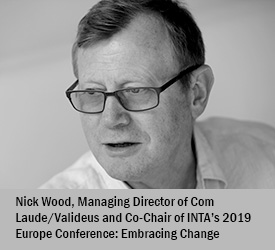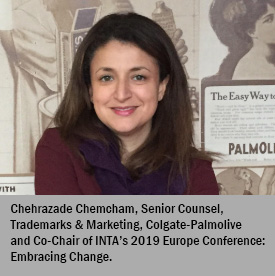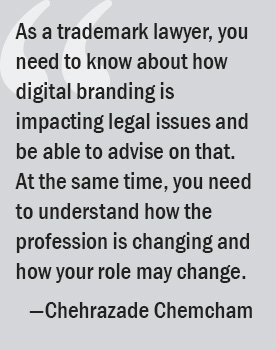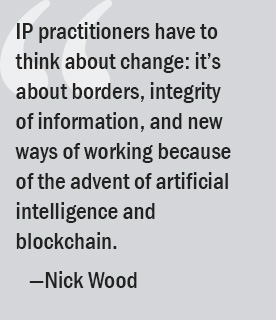2019 Europe Conference Co-Chairs Discuss the Need to Embrace Change
Published: December 15, 2018
 Chehrazade Chemcham, Senior Counsel, Trademarks & Marketing, Colgate-Palmolive, and Nick Wood, Managing Director of Com Laude/Valideus, are serving as Co-Chairs of INTA’s 2019 Europe Conference: Embracing Change, to be held in Paris on February 18 – 19, 2019.
Chehrazade Chemcham, Senior Counsel, Trademarks & Marketing, Colgate-Palmolive, and Nick Wood, Managing Director of Com Laude/Valideus, are serving as Co-Chairs of INTA’s 2019 Europe Conference: Embracing Change, to be held in Paris on February 18 – 19, 2019.
In this interview, the Co-Chairs discuss the themes of the conference, which topics will be covered, and why you should consider attending.
The title of the Conference is “Embracing Change.” What is it about?
Nick Wood (NW): The context is that, in the last half of the 20th century, the European Union was born and brought with it geopolitical unity, peace, and prosperity. In the first quarter of the 21st century, however, we have seen the rise of populism, questions about borders and sovereignty, and technological change. Behind issues such as Brexit, cybersecurity, personal data, disinformation, and youth unemployment, intellectual property (IP) practitioners have to think about change: it’s about borders, integrity of information, and new ways of working because of the advent of artificial intelligence (AI) and blockchain. People in IP are having a long hard look at institutions, at the effectiveness of remedies, at ways of working. So the geopolitical issues are being mirrored in the world of IP.
 Chehrazade Chemcham (CC): Also, businesses are leveraging technology to improve products and processes. Digital technology changes how companies interact with consumers. We as trademark lawyers need to become more technologically savvy and understand how these changes are impacting businesses. As lawyers, we also have to understand the impact that political changes might have on business-especially when they are sudden or revolutionary-in order to help minimize possible negative effects.
Chehrazade Chemcham (CC): Also, businesses are leveraging technology to improve products and processes. Digital technology changes how companies interact with consumers. We as trademark lawyers need to become more technologically savvy and understand how these changes are impacting businesses. As lawyers, we also have to understand the impact that political changes might have on business-especially when they are sudden or revolutionary-in order to help minimize possible negative effects.
How can trademark practitioners learn to embrace and adopt change, rather than fear it?
NW:The secret is to be prepared. Lawyers like to understand the whole picture and to have information and certainty. Change doesn’t have to be a leap in the dark; it can be an informed decision. Not so long ago we were talking about the advent of social media; now people have adapted to that, and are asking: can we trust it? It’s a two-stage process: first understand the change and second adapt in response to it.
CC: The only way to keep up with change is to embrace it; otherwise, you could be left behind. I have been impressed by how trademark practitioners push the boundaries of trademark law in response to changes, such as exploring new types of marks and how to best protect them and new means of enforcement. They have a history of embracing changes. That’s why the trademark bar is doing so well!
 How do those geopolitical changes affect trademark practice on a practical level?
How do those geopolitical changes affect trademark practice on a practical level?
NW: Many brands want to create a lasting relationship with young people and that’s very difficult. We’ve learned to use tools like social media, but some young people now mistrust those. We need to exploit these opportunities but be more skeptical than we have been so far. We’ve got to open our minds to this kind of change and balance regulation and commercialization but it’s difficult when there’s a lot of mistrust in the great organs of state. Most of us have relied on governments to provide security and stability for business but suddenly everything we know is shaking.
CC: A brand is very personal to people and so brands can be a constant in people’s lives. It is a promise and stands for reputation and quality. That’s why you have lots of brands on social media and more communication around corporate social responsibility (CSR). People want to understand what their favorite brands stand for. They take pride in their choices when it comes to branding: they can control where they spend their money, even if they can’t control what’s going on around them.
NW: It’s about signposting trust, across borders and technologies. With lots of change, you need to put your faith in something, so those brand values are more important than ever.
What in the program reflects these themes?
NW: There are really three layers: what you need to know, new ways of working, and aspects of technology and change. The first includes some immediate topics, such as data protection and copyright reform-issues that affect trademark practitioners not only in Europe but globally.  Then, building on that, there are sessions on new ways of working, notably the future role of IP offices (IPOs). The third area is about things like influencers, blockchain, and online marketplaces.
Then, building on that, there are sessions on new ways of working, notably the future role of IP offices (IPOs). The third area is about things like influencers, blockchain, and online marketplaces.
CC: As a trademark lawyer, you need to know about how digital branding is impacting legal issues and be able to advise on that. At the same time, you need to understand how the profession is changing and how your role may change. The speakers will be both in-house and outside counsel and we will also have experts in blockchain and AI tools and even social media influencers.
AI and blockchain are areas where people may see a threat to their business. What are the key things people need to think about here?
CC: In terms of AI, we are focusing on the tools, and how such tools can help us manage administrative and repetitive work more efficiently. There will always be a need for lawyers, but AI will help us conduct clearances more efficiently, connect data to help us better analyze cases and outcomes, and automate recordkeeping. It’s going to help make our lives easier by making our jobs better, more productive, and more accurate as well. I’m looking forward to it, but it’s true that it will change the profession: some jobs will change, but there will be new types of jobs too. In terms of blockchain, it’s a promising tool for IP practitioners and should help us with authentication, recordkeeping, and evidence. We need to understand it better so we can advise our clients/businesses how to best leverage blockchain for IP issues.
NW: Blockchain is also going to be really interesting for contracts, which will have an impact on IP professionals.
What do you hope people will take away from this Conference?
NW: We hope they will go back to their businesses and brands and take into meetings a sense of determined optimism that the changes coming can be embraced to the strategic benefit of the organization. It’s an opportunity to take a step back from what you’re doing and think about it outside of your normal environment. Where are we going to be in three years’ time? The changes coming do not need to be feared if you plan for them.
CC: We have a super team working on this Conference, and a good number of our speakers confirmed very quickly, which speaks to the interest in the topics.
Register for the Conference here!
More Reasons to Visit Paris
The Europe Conference will be held at the Westin Paris-Vendôme, which Chehrazade Chemcham describes as “an amazing location.” She says: “The Conference is taking place near Place Vendôme, near the Louvre, the Jardin des Tuileries, and the Seine River. Pont Neuf, the Eiffel Tower, the Place de la Concorde, and lots of super-exclusive shopping are all in walking distance!” Nick Wood adds that Paris is “a perfect setting” for a conference about looking forward: “The city has that special heritage and tradition and the atmosphere that seeps into you when you go-and on February 18 and 19, we hope there will also be a great bunch of people!”
Although every effort has been made to verify the accuracy of items in the INTA Bulletin, readers are urged to check independently on matters of specific concern or interest. Law & Practice updates are published without comment from INTA except where it has taken an official position.
© 2018 International Trademark Association
This website uses cookies so that we can provide you with the best user experience possible. Cookie information is stored in your browser and performs functions such as recognising you when you return to our website and helping our team to understand which sections of the website you find most interesting and useful.
To find out more please see our Cookies Policy and Privacy Policy.
These cookies are used to identify a user’s browser as the visitor goes from page to page on the Site. These are session cookies, which means that the cookie is deleted when you leave the Site. It is an integral piece of the Site software and used to let the server know which users are on the Site at any given time and make certain parts of the Site easier to use.
|
|
If you disable this cookie, we will not be able to save your preferences. This means that every time you visit this website you will need to enable or disable cookies again.
These cookies are used to collect information about how visitors use our Site. The cookies collect information in anonymous form, including the numbers of visitors to the Site, where visitors have come to the Site from, the pages they visited and how they have interacted with tools on the Site like search and embedded media players. We use the information to compile statistical reports of our users’ browsing patterns so that we can improve the Site.
|
|
Please enable Functionality Cookies first so that we can save your preferences!
These cookies are used to deliver advertising relevant to the interests of visitors to our Site. They are persistent, which means they will remain on your device after you leave the Site.
- Facebook (Ad Pixel)
- Google (Ad Pixel)
- LinkedIn (Ad Pixel)
- Quattro Anonymous
Please enable Functionality Cookies first so that we can save your preferences!
